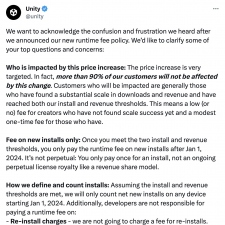Game development platform Unity has reached out on X (formerly Twitter), attempting to clarify aspects of their new Unity Runtime Fees that have sparked massive backlash from developers.
The move by Unity, has already triggered a huge outpouring of upset, with some even questioning the legality of such a move.
Now, in the face of a barrage of complaint Unity have attempted to clarify their position and the effect that they’re new pricing structure will have on their users in an X (formerly Twitter) post.
The text aims to make clear the wider effects of its introduction and stem rumours and speculation. The fact remains however that the most aggretious element of its introduction – developers paying Unity a new $0.20 fee for each new app install they obtain – remains resolutely in place.
Thus the post seems to have done little to stem the tide of anger.
The post in full reads:
We want to acknowledge the confusion and frustration we heard after we announced our new runtime fee policy. We’d like to clarify some of your top questions and concerns:
Who is impacted by this price increase: The price increase is very targeted. In fact, more than 90% of our customers will not be affected by this change. Customers who will be impacted are generally those who have found a substantial scale in downloads and revenue and have reached both our install and revenue thresholds. This means a low (or no) fee for creators who have not found scale success yet and a modest one-time fee for those who have.
Fee on new installs only: Once you meet the two install and revenue thresholds, you only pay the runtime fee on new installs after Jan 1, 2024. It’s not perpetual: You only pay once for an install, not an ongoing perpetual license royalty like a revenue share model.
How we define and count installs: Assuming the install and revenue thresholds are met, we will only count net new installs on any device starting Jan 1, 2024. Additionally, developers are not responsible for paying a runtime fee on:
• Re-install charges – we are not going to charge a fee for re-installs.
• Fraudulent installs charges – we are not going to charge a fee for fraudulent installs. We will work directly with you on cases where fraud or botnets are suspected of malicious intent.
• Trials, partial play demos, and automation installs (devops) charges – we are not going to count these toward your install count. Early access games are not considered demos.
• Web and streaming games – we are not going to count web and streaming games toward your install count either.
• Charity-related installs – the pricing change and install count will not be applied to your charity bundles/initiatives.
User Tiani Pixel commented on this discrepancy in professional users versus hobbyists, “Unity has a lot of usage by hobbyists and students that aren’t currently releasing games, so this data doesn’t matter and is very misleading.”
Game developer MrFish questions of how Unity tracks installs is still far from answered even with this attempt at clarification. And it seems the fear is that game developers will be pulled down with the ship if Unity sets off GDPR violations.

The clarity relating to charity-related installs is an interesting inclusion. Rami Ismail pointed out in a widely circulated LinkedIn post, “For example, here’s a ‘fun’ thought experiment with Unity’s new pricing model: If you made a game that just reached $200K in revenue at a 50/50 publisher split, and you decided to support say, the itch.io charity bundle for Racial Justice, which had about 800,000 installs, you’d end up up to $60K in debt.”
The fact that Ismail’s comments seem to have been addressed directly indicates that there is a worry at Unity HQ about the vociferous reaction seen across the game industry.
With frustration from game developers still mounting, this controversy is unlikely to fade anytime soon.

